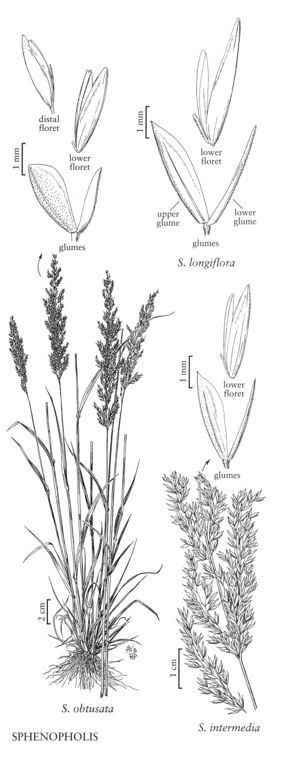Difference between revisions of "Sphenopholis intermedia"
FNA>Volume Importer |
imported>Volume Importer |
||
| (8 intermediate revisions by 2 users not shown) | |||
| Line 4: | Line 4: | ||
|publications= | |publications= | ||
|common_names=Slender wedgegrass;Sphenopholis intermédiare | |common_names=Slender wedgegrass;Sphenopholis intermédiare | ||
| + | |special_status={{Treatment/ID/Special_status | ||
| + | |code=E | ||
| + | |label=Endemic | ||
| + | }} | ||
|basionyms= | |basionyms= | ||
|synonyms={{Treatment/ID/Synonym | |synonyms={{Treatment/ID/Synonym | ||
|name=Sphenopholis obtusata var. major | |name=Sphenopholis obtusata var. major | ||
| − | |authority= | + | |authority= |
| − | }}{{Treatment/ID/Synonym | + | |rank=variety |
| + | }} {{Treatment/ID/Synonym | ||
|name=Sphenopholis intermedia var. pilosa | |name=Sphenopholis intermedia var. pilosa | ||
| − | |authority= | + | |authority= |
| + | |rank=variety | ||
}} | }} | ||
|hierarchy=Poaceae;Poaceae subfam. Pooideae;Poaceae tribe Poeae;Sphenopholis;Sphenopholis intermedia | |hierarchy=Poaceae;Poaceae subfam. Pooideae;Poaceae tribe Poeae;Sphenopholis;Sphenopholis intermedia | ||
| Line 22: | Line 28: | ||
-->{{Treatment/Body | -->{{Treatment/Body | ||
| − | |distribution=Conn.;N.J.;N.Y.;Wash.;Del.;D.C;Wis.;W.Va.;Mass.;Maine;N.H.;R.I.;Vt.;Fla.;Wyo.;Utah;N.Mex.;Tex.;La.;Tenn.;N.C.;S.C.;Pa.;Nev.;Va.;Colo.;Alaska;Ala.;Kans.;N.Dak.;Nebr.;Okla.;S.Dak.;Ark.;Ill.;Ga.;Ind.;Iowa;Ariz.;Idaho;Md.;Ohio;Mo.;Minn.;Mich.;Mont.;Alta.;B.C.;Man.;N.B.;Nfld. | + | |distribution=Conn.;N.J.;N.Y.;Wash.;Del.;D.C.;Wis.;W.Va.;Mass.;Maine;N.H.;R.I.;Vt.;Fla.;Wyo.;Utah;N.Mex.;Tex.;La.;Tenn.;N.C.;S.C.;Pa.;Nev.;Va.;Colo.;Alaska;Ala.;Kans.;N.Dak.;Nebr.;Okla.;S.Dak.;Ark.;Ill.;Ga.;Ind.;Iowa;Ariz.;Idaho;Md.;Ohio;Mo.;Minn.;Mich.;Mont.;Alta.;B.C.;Man.;N.B.;Nfld. and Labr. (Labr.);N.S.;N.W.T.;Ont.;P.E.I.;Que.;Sask.;Yukon;Miss.;Ky.;Oreg. |
| − | |discussion=<p>Sphenopholis intermedia grows at 0-2500 m in wet to damp sites, sites that dry out after the growing season, and sites with clay soils that retain moisture. Restricted to the Flora region, it is found in forests, meadows, and waste places throughout most of the region other than the high arctic. It differs from Koeleria macrantha (p. 754), with which it is sometimes confused, in its more open panicles and in having spikelets that disarticulate below the glumes.</p> | + | |discussion=<p><i>Sphenopholis intermedia</i> grows at 0-2500 m in wet to damp sites, sites that dry out after the growing season, and sites with clay soils that retain moisture. Restricted to the Flora region, it is found in forests, meadows, and waste places throughout most of the region other than the high arctic. It differs from <i>Koeleria macrantha</i> (p. 754), with which it is sometimes confused, in its more open panicles and in having spikelets that disarticulate below the glumes.</p> |
|tables= | |tables= | ||
|references= | |references= | ||
| Line 32: | Line 38: | ||
-->{{#Taxon: | -->{{#Taxon: | ||
name=Sphenopholis intermedia | name=Sphenopholis intermedia | ||
| − | |||
|authority=(Rydb.) Rydb. | |authority=(Rydb.) Rydb. | ||
|rank=species | |rank=species | ||
| Line 39: | Line 44: | ||
|basionyms= | |basionyms= | ||
|family=Poaceae | |family=Poaceae | ||
| − | |distribution=Conn.;N.J.;N.Y.;Wash.;Del.;D.C;Wis.;W.Va.;Mass.;Maine;N.H.;R.I.;Vt.;Fla.;Wyo.;Utah;N.Mex.;Tex.;La.;Tenn.;N.C.;S.C.;Pa.;Nev.;Va.;Colo.;Alaska;Ala.;Kans.;N.Dak.;Nebr.;Okla.;S.Dak.;Ark.;Ill.;Ga.;Ind.;Iowa;Ariz.;Idaho;Md.;Ohio;Mo.;Minn.;Mich.;Mont.;Alta.;B.C.;Man.;N.B.;Nfld. | + | |illustrator=Linda Ann Vorobik;Hana Pazdírková |
| + | |illustration copyright=Utah State University | ||
| + | |distribution=Conn.;N.J.;N.Y.;Wash.;Del.;D.C.;Wis.;W.Va.;Mass.;Maine;N.H.;R.I.;Vt.;Fla.;Wyo.;Utah;N.Mex.;Tex.;La.;Tenn.;N.C.;S.C.;Pa.;Nev.;Va.;Colo.;Alaska;Ala.;Kans.;N.Dak.;Nebr.;Okla.;S.Dak.;Ark.;Ill.;Ga.;Ind.;Iowa;Ariz.;Idaho;Md.;Ohio;Mo.;Minn.;Mich.;Mont.;Alta.;B.C.;Man.;N.B.;Nfld. and Labr. (Labr.);N.S.;N.W.T.;Ont.;P.E.I.;Que.;Sask.;Yukon;Miss.;Ky.;Oreg. | ||
|reference=None | |reference=None | ||
|publication title= | |publication title= | ||
|publication year= | |publication year= | ||
| − | |special status= | + | |special status=Endemic |
| − | |source xml=https:// | + | |source xml=https://bitbucket.org/aafc-mbb/fna-data-curation/src/200273ad09963decb8fc72550212de541d86569d/coarse_grained_fna_xml/V24/V24_889.xml |
|subfamily=Poaceae subfam. Pooideae | |subfamily=Poaceae subfam. Pooideae | ||
|tribe=Poaceae tribe Poeae | |tribe=Poaceae tribe Poeae | ||
Latest revision as of 17:25, 11 May 2021
Culms (5)30-120 cm. Sheaths smooth or scabridulous, sometimes pubescent; ligules 1.5-2.5 mm, erose-ciliate, often lacerate; blades 8-15 cm long, (1)2-6 mm wide, flat to slightly involute. Panicles (2)7-20 cm long, (0.5)1-3 cm wide, usually nodding, not spikelike, spikelets usually loosely arranged. Spikelets 2.1-4 mm. Lower glumes less than 1/3 as wide as the upper glumes; upper glumes 1.9-2.9 mm, oblanceolate to obovate, not subcucullate, width/length ratio 0.23-0.35, apices acute, rounded, or subtruncate; lowest lemmas 2.1-3 mm, smooth or scabridulous; distal lemmas usually smooth on the sides, rarely scabridulous near the apices, unawned; anthers 0.2-0.8 mm. 2n = 14.
Distribution
Conn., N.J., N.Y., Wash., Del., D.C., Wis., W.Va., Mass., Maine, N.H., R.I., Vt., Fla., Wyo., Utah, N.Mex., Tex., La., Tenn., N.C., S.C., Pa., Nev., Va., Colo., Alaska, Ala., Kans., N.Dak., Nebr., Okla., S.Dak., Ark., Ill., Ga., Ind., Iowa, Ariz., Idaho, Md., Ohio, Mo., Minn., Mich., Mont., Alta., B.C., Man., N.B., Nfld. and Labr. (Labr.), N.S., N.W.T., Ont., P.E.I., Que., Sask., Yukon, Miss., Ky., Oreg.
Discussion
Sphenopholis intermedia grows at 0-2500 m in wet to damp sites, sites that dry out after the growing season, and sites with clay soils that retain moisture. Restricted to the Flora region, it is found in forests, meadows, and waste places throughout most of the region other than the high arctic. It differs from Koeleria macrantha (p. 754), with which it is sometimes confused, in its more open panicles and in having spikelets that disarticulate below the glumes.
Selected References
None.
